If a company’s application is rejected by the SEC, it cannot offer securities-related services in the US, at least not in the form described in the application. Due to confusion over the classification of crypto assets, this possibility could pose an “existential threat,” Siemer says. “Going in and registering means ceasing to exist,” he says. “There is no framework; there is no path.”
The question of what crypto is could be resolved in court. An ongoing case between the SEC and cross-border payment company Ripple over cryptocurrency, for example, XRP, is expected to shed some light on whether cryptocurrencies should be treated as securities (and regulated by the SEC) or not. After two years, a decision in the case is imminent, but because it is set in a district court, it will not set a binding precedent. A win for the SEC, however, would bolster its case for becoming the de facto crypto regulator.
People in the industry say it would be a better resolution if the US Congress introduces extensive legislation for crypto. The European Union is on track to introduce broad crypto legislation in 2024, under the Markets in Crypto Act (MiCA), and countries like Japan and the UAE have also acted quickly, but the US is lagging behind. A number of crypto-related bills were introduced during the 177th Congress, but died when the last session ended in December, so will need to be formally resubmitted and discussed again.
Mulvaney, who spent six years in the House of Representatives, says anything resembling comprehensive crypto legislation is unlikely to make it through Congress this year ahead of the 2024 presidential election. But the silver lining, he says, is that crypto is “bipartite” – it appeals to libertarian beliefs on both sides of the political divide – meaning that the question of legislation will not be resolved along “tribal lines”.
“It’s hard to work without regulation because you don’t know what you are,” says Mulvaney. “You don’t want to be over-regulated…but you need enough guidance and clarity. That’s the right place.”
In some parts of the crypto community, regulators’ refusal to draw clear lines has been interpreted as a deliberate attempt to squeeze the industry out of the US.
Regardless of intent, the result of continued ambiguity over crypto asset classification, the responsible regulator and the process of registering services with the government is likely to be an exodus of crypto companies from the country, Mulvaney and Siemer say.
At the end of March, Circle Internet Financial, issuer of the USDC stablecoin, announced announced plans to establish a European headquarters in Paris. Coinbase is also planning an offshore version of its trading platform, according to a Bloomberg report. Grewal declined to confirm, but says the company is “carefully watching growth in markets outside the US.”
A similar pattern is playing out among smaller crypto companies. Wave Digital Assets is preparing its own contingency plan, says Siemer. While the company is not yet considering leaving the US, it has halted hiring in the country over concerns about the regulatory environment.
Peirce, the SEC commissioner, says the agency’s goal is to enable safe experimentation with technology, not to push the crypto industry offshore. But she is sympathetic to the interpretation. “If you are trying to send the message that you want crypto in the United States, but you want it to be compliant, the way to send that message is to help companies [to become compliant]. But we don’t see that happening,” she says.
“You don’t fix the situation by saying ‘come in and sign up’ – because no one knows what that means – but by getting everyone in a room and having a conversation like adults.”

